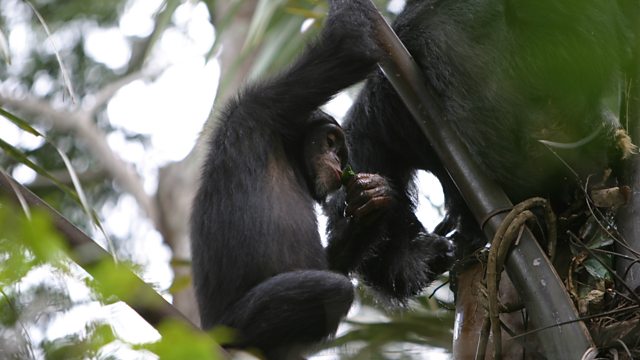
Alcohol Drinking in Wild Chimpanzees
Wild chimpanzees partial to alcohol drinking a new study shows. Tanya Humle from the University of Kent describes the novel behaviour.
A new paper shows the first recorded instances of alcohol drinking in wild chimpanzees. Tanya Humle from the University of Kent describes the novel behaviour. With anthropologist professor Catherine Hill, Dr Humle discusses whether 'wild' chimp research is even possible in an age when human and chimp habitats overlap.
Is a Rat Better than a Microscope?
Hugh Sykes finds that giant rats in Mozambique are effective at detecting TB.
Juvenile Camels 'Key Source' of Mers
Camels aged less than four years might be a major source of Mers, according to new research. An international team looked for evidence of current or past infection in more than 800 dromedary camels.They found that more than 90% of animals became infected by the age of two and virus shedding was more common in calves than in adults.
Self-healing Aeroplane Wings
Aeroplane wings that can 'fix tiny cracks' could be introduced in the next five to 10 years, say UK researchers at the University of Bristol. The team drew inspiration from the way the human body heals from a cut with blood that hardens into a scab.
Researchers Find Sweet Source for Aviation Biofuel
Researchers have identified a new way to produce aviation fuel from sugarcane biomass that could deliver substantial cuts in greenhouse gas emissions. The source crops could be grown on marginal land, avoiding displacing food production, the team observed.
Early Galaxies and ALMA
The ALMA telescope array in the Atacama Desert is one of the most sensitive earth based telescopes. It has now captured images of the very first galaxies. Adam Rutherford talks to Dr Mark Swinbank of Durham University who is part of the team who have unleashed data this week from that universal hinterland that is set to fill in the missing gaps in our understanding of the evolution of the universe.
Stephanie Shirley
As a young woman, Stephanie Shirley worked at the Dollis Hill Research Station building computers from scratch, but she told young admirers that she worked for the Post Office, hoping they would think she sold stamps. In the early 60s she changed her name to Steve and started selling computer programmes to companies who had no idea what they were or what they could do, employing only mothers who worked from home writing code by hand with pen and pencil who then posted it to her. By the mid-80s her software company employed 8,000 people, still mainly women with children. She made a fortune but these days Stephanie thinks less about making money and much more about how best to give it away.
Tim Hunt
A Nobel laureate has resigned from his position as honorary professor at a UK university after he made comments about the "trouble with girls" in science. University College London said Sir Tim Hunt - a Royal Society fellow - had resigned from his position within its faculty of life sciences. He told a conference that women in labs "cry" when criticised and "fall in love" with male counterparts.
'Blood cells' Found in Dinosaur Fossils
Researchers have discovered what appear to be the remnants of red blood cells and connective tissue in 75 million-year-old dinosaur fossils. The work could shine a light on long-standing questions about dinosaur physiology, including whether specific species were warm- or cold-blooded. Chemical analysis revealed similarities between blood cells from fossils and those from living emu.
The Science Hour was presented by Roland Pease with comments from Melissa Hogenboom.
(Photo: Young chimpanzee using a leaf sponge to drink palm wine. Credit: Gaku Ohashi, Chubu University, Japan, and Wildlife Research Center, Kyoto University, Japan)
Last on
Broadcasts
- Sat 13 Jun 2015 21:05GMT成人快手 World Service Online
- Sun 14 Jun 2015 10:05GMT成人快手 World Service Online
Podcast
-
![]()
Unexpected Elements
The news you know, the science you don't

